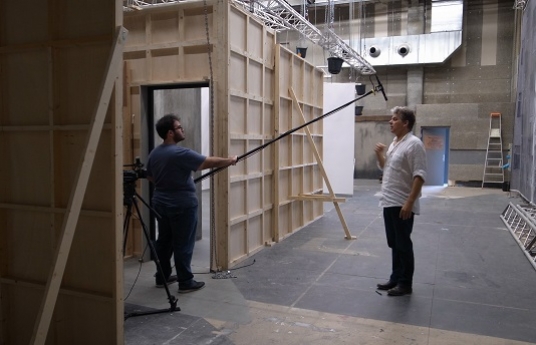Two Qatari filmmakers commence Gulf Summer University programme at Leading French Film School, La Fémis
Aug 16, 2015

The Doha Film Institute supports filmmakers’ participation in intensive training programme held in Paris through partnership with the French Embassy in Qatar and the national film school of France
Doha, Qatar; August 16, 2015: The Doha Film Institute is supporting two Qatari filmmakers to attend the second annual edition of the Gulf Summer University, created by the French Ministry of Foreign Affairs through its Gulf Film Office in association with the prestigious French National Film School, La Fémis. A special training programme created to nurture the filmmaking skills of GCC-based young directors, the Gulf Summer University is being held in Paris until September 11, 2015.
Founded in 2014, The Gulf Summer University is welcoming Qatari filmmakers for the first time to the programme this year. The Doha Film Institute joined hands with the French Embassy in Qatar to identify the two participants, further underlining the commitment of France and Qatar to contribute to cultural and cinematic development in the region.
Fatma Al Remaihi, Chief Executive Officer of the Doha Film Institute, said: “The Gulf Summer University is an exceptional opportunity for our young filmmakers to learn from masters of cinema in the creatively invigorating city of Paris. We are committed to extending all possible support to nurture our emerging filmmakers and to provide them with access to the knowledge and training to fortify their skills. Through our partnership with the French Embassy and La Fémis, we are highlighting the global collaborations that are of great benefit to our filmmakers’ development.”
Marc Nicolas, Director General of La Fémis, said: “We are very pleased to welcome young aspiring filmmakers from the GCC countries in our school for five weeks. We hope this training programme will help them develop their skills, discover the diversity of our French cinema and contribute to establish professional basis back in their country.”
The Gulf Summer University 2015 is organised with the support of GCC organisations including the Doha Film Institute in Qatar as well as Cinescape in Kuwait, Total in the UAE, Technal Middle East, Dadahai, a private donor in Bahrain, and the French Embassies and Alliances Française offices in the GCC region.
Open only for seven young national filmmakers from the GCC region, the programme aims to develop their filmmaking skills in a holistic way across multiple disciplines through classes led by professionals from the French film industry.
The five-week programme consists of intensive classes five days a week, during which the trainees will explore the craft of filmmaking and discover contemporary French cinema through critical evaluations of works by major French directors. The theory programme will cover production craft, the work of a producer, co-production, funds and festivals, cinema aesthetics, French cinema, screenwriting, film fundamentals, script continuity, story breakdown, directing and casting.
They will then go on to direct a five-minute film based on an existing script covering aspects such as rewriting, location scouting, shooting for one day and editing in four days. Each trainee, in turn, assumes directing, camera operating and photography, sound recording and editing. For that purpose, they will all be taught the fundamentals of cinematography, sound recording and editing.
La Fémis was created in 1986, and chaired by international award winning director Raoul Peck since 2010. Supported by the French Ministry of Culture and Media, La Fémis trains 50 students every year to be directors, screenwriters, producers, editors, directors of photography, sound designers, production designers, continuity supervisors, film distributors and exhibitors. It is ranked as the 6th best school in the world by The Hollywood Reporter in their recent rankings.
La Fémis is actively involved in setting up exchange agreements with international film schools, organising common curricula with partner schools, creating special programmes for foreign students, organising a short programme for European documentary filmmakers and various activities within the network of film schools. Recently, it developed a consulting service for countries wishing to create high standard educational film programmes.